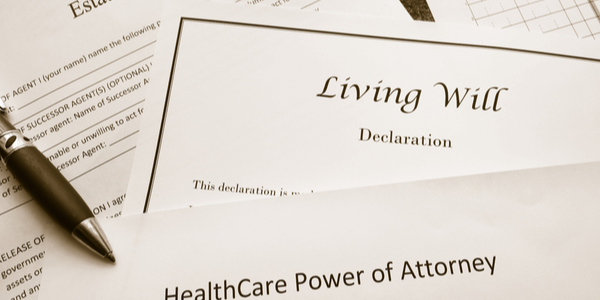Do I Need A Will

Many people who have not gotten around to having a Will prepared wonder, Do I even need a Will? The short answer is, yes! No one can anticipate what the future holds or what your family situation may be when you pass away. If a person dies without a Will (intestate), Texas law provides how your estate will pass and to whom – this is called “Intestate Succession.” If you pass without a will, intestate succession is:

What is Intestate Succession?
- If there is no spouse, the estate passes to the deceased’s children and children’s descendants.
- If no child, the estate passes to the deceased’s mother and father, equally.
- If only one parent survives, then ½ of the estate goes to the surviving parent and the other half passes to the deceased’s siblings or sibling’s descendants.
- If neither parent survives, then the deceased’s estate passes entirely to the siblings and the sibling’s descendants.
If there are no surviving parents or siblings, the Estates Code details how the estate will pass to further removed relatives. If a person dies with a spouse, the community estate will pass to the spouse (unless the person has a child or children that are not the children of the surviving spouse), and any separate property passes: 1/3 to the surviving spouse and 2/3 to the person’s children.
There are many reasons the intestate succession does not work for most people. A person’s children may be very young at the time of death, an adult child may have made a series of bad decisions that renders that child incapable of handling the inheritance responsibly, a person may be estranged from his or her parents or siblings, and would rather leave the money to a friend or other relative instead.
Children are Under 18
If a child or children are minors when a person passes, a person’s Will can set up a contingent trust for minor children. The trust is set up to distribute the assets to the child at an age at which the deceased person elects in their Will. Some people elect that all assets be distributed at a certain age or some people elect for a percentage of assets to be distributed at varying ages. For example, someone may elect that one-third of the assets be distributed at the age of 21, one-third at the age of 25, and one-third at the age of 30. This provides more control over the assets and limits the amount of money a young person gains control over at one time. A trustee will also be appointed in the Will to manage the trust. This should be a person you trust completely.
Other Issues Relating to Intestate Succession
A Will may leave nothing, or a smaller share, to a child than what is left to the person’s other children. This is more common with adult children when one’s behavior makes the parent want to leave them less, or nothing. Without a Will, each child takes equally.
Similarly, if a person leaves no surviving children and is estranged from his or her parents or siblings, without a Will those relatives will get a portion of the estate.
A Will should also provide for a guardian of minor children. Even with a Will, the child’s surviving parent will continue to look after the children, but if the other parent has passed away, or passes simultaneously, a Court will determine guardianship of a child. The Court’s determination may not be who the decedent would have chosen had he or she had a Will.
What if I am going Through a Divorce?
A person should have a Will prepared if he or she is going through a divorce and no longer wishes for one-half of the community property or any separate property to pass to a spouse should something happen while the divorce is pending. Without a Will, the community property will pass to the surviving spouse if the only surviving children are children of both the decedent and the spouse. With a Will, a person can specify that his or her share of the community estate be left to the children. Similarly, if the person has separate property, it is important to specify that no property be left to the spouse. Otherwise, the spouse will take one-third of any separate property that a person may have intended be left to his or her children.
What Other Documents Do I Need?
Besides a Will, a person should have: Statutory Power of Attorney, Medical Power of Attorney, HIPAA Release and Directive to Physicians.
Statutory Power of Attorney – A Statutory Power of Attorney provides for the appointment of an agent to manage a person’s affairs if he or she becomes incapacitated. The person can elect for the agent to have only limited powers or can elect for the agent to act in an almost unlimited capacity. Examples of the powers conveyed are business transaction, banking transactions, real estate transactions, and tax matters.
Medical Power of Attorney – A medical Power of Attorney provides for the appointment of an agent to make a person’s health care decisions should the person become incapacitated. Any person appointed under the Statutory Power of Attorney or a Medical Power of Attorney should be someone you trust implicitly.
HIPAA Release – The HIPAA Release allows the agent appointed in the Medical Power of Attorney, and anyone else a person chooses, to have access to protected health information.
Directive to Physicians – If a person is suffering from a terminal or irreversible condition, the Directive to Physicians allows the person to elect whether he or she wants to be kept alive using any life sustaining treatments, or for treatments to be discontinued or withheld.
These documents, with a Will, are included in the Will Package offered by McNamara Law Office, PLLC. Contact us if you would like additional information related to our Will Packages.

Related Topics
Geographical Areas Served:
Kingwood, Huffman, Lake Houston, Atascocita, Humble, Oakhurst, Walden, Walden Woods, Walden on Lake Houston, East FM 1960, The Woodlands, Fall Creek, Eagle Springs, Lakeshore, Silverlake, Redstone, Summerwood, Eagle Lake, West Lake Houston Parkway, The Heights, Greater Heights, Houston Heights, Downtown Houston, Memorial, Allen Parkway, Montrose, Houston Neartown, Houston Midtown and East Montgomery County.
Google Reviews
incredibly attentive and detail-oriented, making sure every aspect of my case was thoroughly addressed. Their professionalism and dedication to my case were outstanding, and I felt supported and well taken care of throughout the entire process. I am grateful for their expertise and would not hesitate to turn to them for future legal matters.
They are not cheap and there are no guarantees but I believe they are absolutely worth it.
You get what you pay for.








